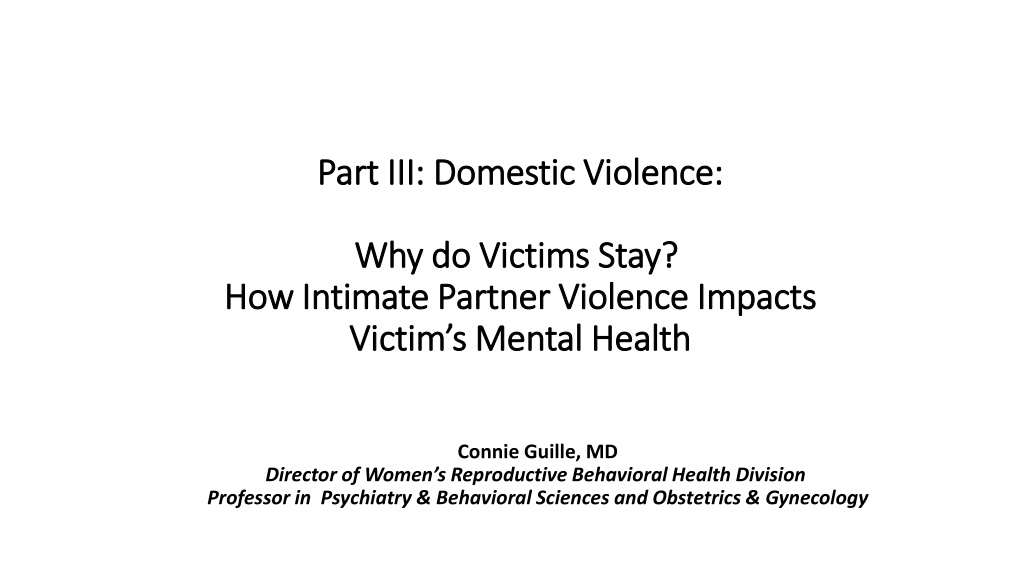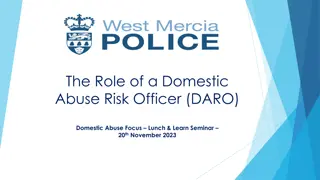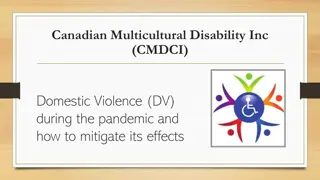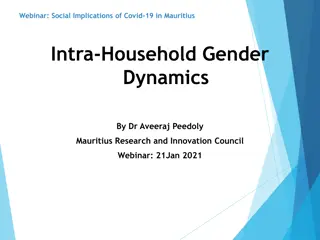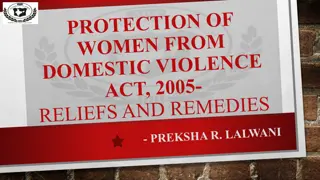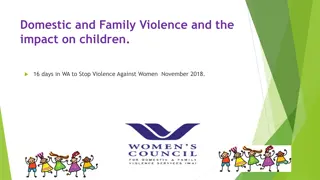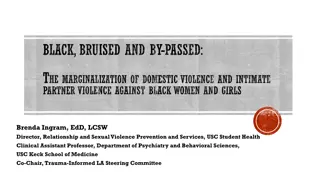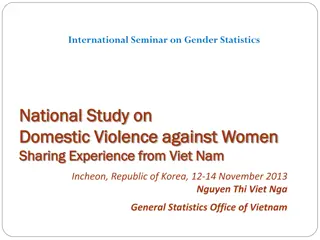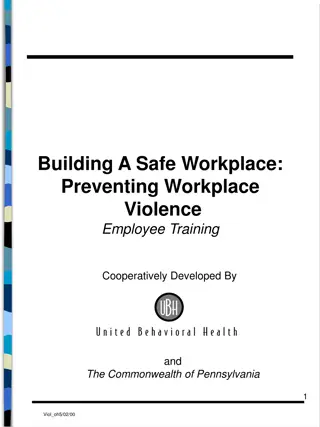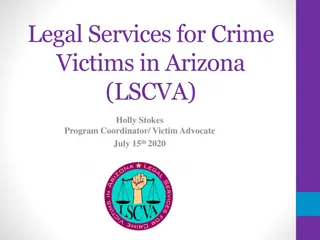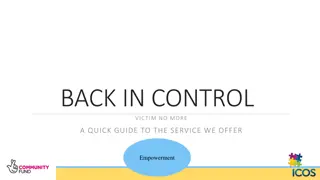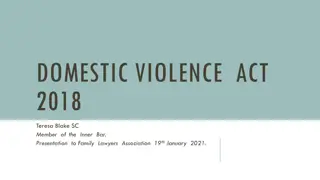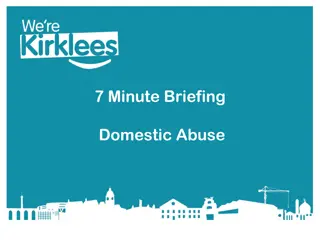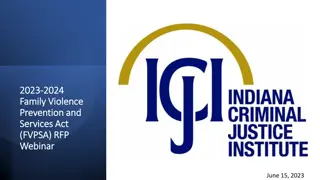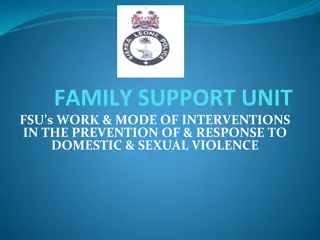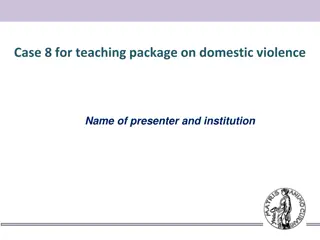Understanding Domestic Violence: Why Victims Stay and How It Affects Mental Health
The discussion delves into the complex issue of why victims of domestic violence choose to stay in abusive relationships. It explores the impact of intimate partner violence on mental health and societal responses to such situations. The case of Janay Palmer and Ray Rice serves as an example, highlighting the challenges victims face when trying to leave abusive partners. Through social media movements like #WhyIStayed, survivors have shared their stories, shedding light on the reasons women stay in harmful relationships.
Download Presentation

Please find below an Image/Link to download the presentation.
The content on the website is provided AS IS for your information and personal use only. It may not be sold, licensed, or shared on other websites without obtaining consent from the author. Download presentation by click this link. If you encounter any issues during the download, it is possible that the publisher has removed the file from their server.
E N D
Presentation Transcript
Part III: Domestic Violence: Part III: Domestic Violence: Why do Victims Stay? Why do Victims Stay? How Intimate Partner Violence Impacts How Intimate Partner Violence Impacts Victim s Mental Health Victim s Mental Health Connie Guille, MD Director of Women s Reproductive Behavioral Health Division Professor in Psychiatry & Behavioral Sciences and Obstetrics & Gynecology
NFL linebacker Ray Rice knocked his fiance Janay Palmer unconscious in an elevator in 2014 He was accused of DV and suspended for two games. A security video of the event surfaced and went viral. Public outrage (e.g., demanding a greater response from NFL) Unexpected turn
Janay Palmer apologized at a press conference: I deeply regret the role I played that night On Instagram Just know we will continue to grow & show the world what real love is Asking others to not take anything from the man she loves. After a few weeks, Rice was formally charged Rice and Palmer were married the next day This provoked a new public response
Attacks on Janay Palmer: Why would someone stay with, let alone defend a man who had knocked her unconscious? What was wrong with Palmer that she would do this? Questions about her sanity, innocence and motives This provoked a response
Victims and womens advocates spoke out in defense #WhyIStayed Beverly Gooden, a human resources manager in North Carolina, started a hashtag on Twitter, #WhyIstayed, where she shared her reasons for remaining in a violent marriage.
#WhyIStayed Hundreds of victims posting their stories of the factors that kept them in abusive relationships
8 Main Reasons Women Stay in 8 Main Reasons Women Stay in Abusive Relationships Abusive Relationships Distorted Thoughts Damaged Self-Worth Fear Wanting to be a savior Children Family Expectations and Experiences Financial Constraints Isolation Cravens, J. D., Whiting, J. B., & Aamar, R. (2015). Why I stayed/left: An analysis of voices of intimate partner violence on social media. Contemporary Family Therapy. DOI 10.1007/s10591-015-9360-8.
Domestic Violence Course Progression of abuse over time (e.g., many years) Chronic, insidious deterioration one s sense of self, self-worth, self efficacy and agency by the aggressor s Constant undermining someone s worth, confidence, abilities, self-esteem (critical, judgmental, not good enough/inadequate, unlovable, degraded, humiliated, shame, self-blame) Control Verbal Abuse Physical Abuse Sexual Abuse Threat of Abuse Social isolation Financially dependent Delusion of love
Domestic Violence Course Progression of abuse over time (e.g., many years) Chronic, insidious deterioration one s sense of self, self-worth, self efficacy and agency by Constant undermining someone s worth, confidence, abilities, self-esteem (critical, judgmental, not good enough/inadequate, unlovable, degraded, humiliated, shame, self-blame) Control Verbal Abuse Physical Abuse Sexual Abuse Threat of Abuse Social isolation Financially dependent
# #WhyIStayed WhyIStayed Distorted Thoughts Damaged Self-Worth Fear Wanting to be a savior Children Family Expectations and Experiences Financial Constraints Isolation Cravens, J. D., Whiting, J. B., & Aamar, R. (2015). Why I stayed/left: An analysis of voices of intimate partner violence on social media. Contemporary Family Therapy. DOI 10.1007/s10591-015-9360-8.
# #WhyIStayed WhyIStayed Distorted Thoughts Being controlled and hurt is traumatizing especially when the person loves you , and this leads to confusion, doubts, and even self-blame: I believed I deserved it I was ashamed, embarrassed, and blamed myself because I thought I triggered him. Minimize the abuse as a way to cope with it: [I stayed] because I didn t think that emotional and financial abuse was really abuse. Because words don t leave bruises, Because I didn t know what my boyfriend did to me was rape. Cravens, J. D., Whiting, J. B., & Aamar, R. (2015). Why I stayed/left: An analysis of voices of intimate partner violence on social media. Contemporary Family Therapy. DOI 10.1007/s10591-015-9360-8.
# #WhyIStayed WhyIStayed Damaged Self-Worth The damage to the self that is the result of degrading treatment. Many women felt beaten down and of no value, saying: He made me believe I was worthless and alone, I felt I had done something wrong and I deserved it. Cravens, J. D., Whiting, J. B., & Aamar, R. (2015). Why I stayed/left: An analysis of voices of intimate partner violence on social media. Contemporary Family Therapy. DOI 10.1007/s10591-015-9360-8.
# #WhyIStayed WhyIStayed Fear Attempting to leave an abuser is dangerous. The threat of bodily and emotional harm is real and powerful, and abusers use this to control and keep women trapped. Female victims of violence are much more likely than male victims to be terrorized and traumatized. I was afraid of him I knew he d make leaving an ugly drawn out nightmare. One woman felt trapped because of her husband s threats of hunting me down and harming all my loved ones including our kids while I watched and then killing me. Cravens, J. D., Whiting, J. B., & Aamar, R. (2015). Why I stayed/left: An analysis of voices of intimate partner violence on social media. Contemporary Family Therapy. DOI 10.1007/s10591-015-9360-8.
# #WhyIStayed WhyIStayed Wanting to be a savior Many described a desire to help, or love their partners with the hopes that they could change them: I believed I could love the abuse out of him. I thought I would be the strong one who would never leave him and show him loyalty. I would fix him and teach him love. His father died, he became an alcoholic and said that God wouldn t want me to leave him because he needed me to make him better. Cravens, J. D., Whiting, J. B., & Aamar, R. (2015). Why I stayed/left: An analysis of voices of intimate partner violence on social media. Contemporary Family Therapy. DOI 10.1007/s10591-015-9360-8.
# #WhyIStayed WhyIStayed Children These women also put their children first, sacrificing their own safety: I was afraid if he wasn t beating me he would beat his kids. And I valued their lives more than my own. I stayed for 20 years while I protected our children, all while I was being abused. Others mentioned staying to benefit the children: I wanted my son to have a father. Cravens, J. D., Whiting, J. B., & Aamar, R. (2015). Why I stayed/left: An analysis of voices of intimate partner violence on social media. Contemporary Family Therapy. DOI 10.1007/s10591-015-9360-8.
# #WhyIStayed WhyIStayed Family Expectations and Experiences. Past experiences with violence distorted their sense of self or of healthy relationships: I watched [my dad] beat my mom. Then I found someone just like dad, Because raised by animals, you partner with wolves. Some mentioned family and religious pressures: My mother told me God would disown me if I broke my marriage. Cravens, J. D., Whiting, J. B., & Aamar, R. (2015). Why I stayed/left: An analysis of voices of intimate partner violence on social media. Contemporary Family Therapy. DOI 10.1007/s10591-015-9360-8.
# #WhyIStayed WhyIStayed Financial Constraints Financial limitations, and these were often connected to caring for children: I had no family, two young children, no money, and guilt because he had brain damage from a car accident. Others were unable to keep jobs because of the abuser s control or their injuries, and others were used financially by their abuser: [My] ex racked up thousands of debt in my name. Cravens, J. D., Whiting, J. B., & Aamar, R. (2015). Why I stayed/left: An analysis of voices of intimate partner violence on social media. Contemporary Family Therapy. DOI 10.1007/s10591-015-9360-8.
# #WhyIStayed WhyIStayed Isolation A common tactic of manipulative partners is to separate their victim from family and friends. Sometimes this is physical, as one woman experienced: I was literally trapped in the backwoods of WV, and he would use my little boy to keep me close. Other times isolation is emotional: You can either have friends and family or you can have me. Cravens, J. D., Whiting, J. B., & Aamar, R. (2015). Why I stayed/left: An analysis of voices of intimate partner violence on social media. Contemporary Family Therapy. DOI 10.1007/s10591-015-9360-8.
Approach Approach Immediate Safety for Victim and other potential victims (children) Are there guns in the home? How are they stored/ Are they loaded and easily accessible Other weapons Safety Plan/Escape Go bag (extra set of car keys, cash, important documents [birth certificates, SS card, passport], diapers/formula, change of clothes) Keep phone, keys and wallet in a place to easily grab and run Where will you go Who will help Who can you call (code word if need help)
Therapeutic Therapeutic Identify & Treat Comorbid Mental Health Conditions Substance Use Disorders Mood & Anxiety Disorders Stress Related Disorders- PTSD Past DV or Trauma History How is past effecting present Why is the patient staying? Identify stuck points and plan to address each while maintaining safety
# #WhyIStayed WhyIStayed Distorted Thoughts Damaged Self-Worth Fear Wanting to be a savior Children Family Expectations and Experiences Financial Constraints Isolation Cravens, J. D., Whiting, J. B., & Aamar, R. (2015). Why I stayed/left: An analysis of voices of intimate partner violence on social media. Contemporary Family Therapy. DOI 10.1007/s10591-015-9360-8.
OUR STATE RESOURCES OUR STATE RESOURCES https://dss.sc.gov/adult-protection/domestic-violence-program/ Lists shelters available Lists programs available South Carolina Coalition against Domestic Violence and Sexual Assault (SCCADVASA) www.sccadvasa.org Interactive map to guide providers and patients to resources
RESOURCES RESOURCES National Domestic Violence Hotline 1-800-799-SAFE (7233) Rape Abuse & Incest National Network (RAINN) Hotline 1-800-656-HOPE (4673)
RESOURCES RESOURCES Futures Without Violence www.futureswithoutviolence.org National Coalition Against Domestic Violence www.ncadv.org National Network to End Domestic Violence www.nnedv.org National Resource Center on Domestic Violence www.nrcdv.org Office on Violence Against Women (U.S. Department of Justice) www.usdoj.gov/ovw
